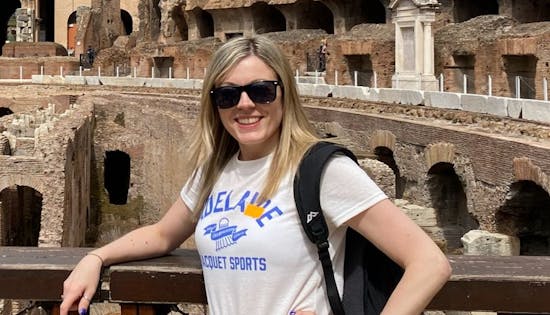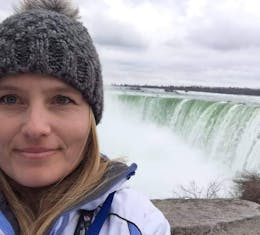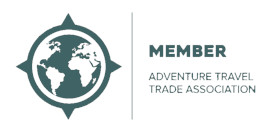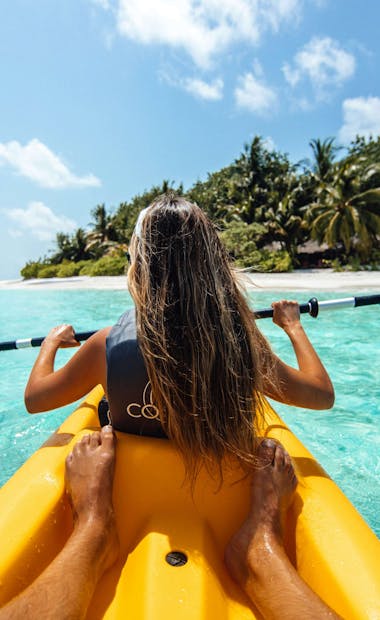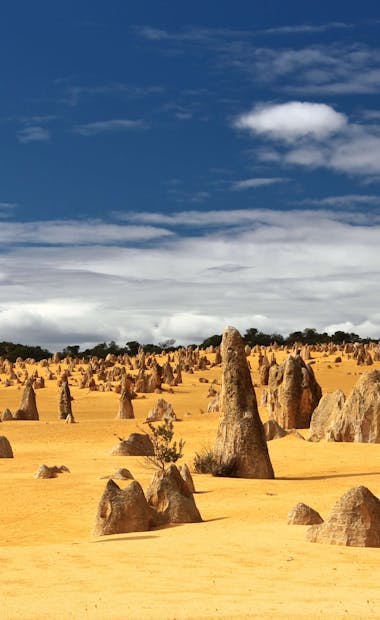
Western Australia Tours
Where Nature Paints Its Grandest Masterpiece
Popular tours
- Save1%
 View Tour
View TourWalk Western Australia's Karijini & Ningaloo Reef - 10 Days
- Paraburdoo to Exmouth
- Age group: 15 - 99
- Max group size: 15
Was:£1,790From£1,772 - Save1%
 View Tour
View TourBroome to the Bungle Bungles - 5 Days
- Broome to Broome
- Age group: 12 - 99
- Max group size: 20
Was:£1,290From£1,277 - Save1%
 View Tour
View TourBest of Northern Territory - 8 Days
- Alice Springs to Darwin
- Age group: 15 - 99
- Max group size: 15
Was:£3,350From£3,316 - Save1%
 View Tour
View TourKarijini Explorer - 5 Days
- Exmouth to Exmouth
- Age group: 15 - 99
- Max group size: 12
Was:£1,860From£1,841
Western Australia
Welcome to the untamed wonderland of Western Australia, where nature paints its grandest masterpiece—a landscape adorned with rugged coastlines, ancient forests, and endless expanses of red earth. As you venture through this extraordinary region, you'll find yourself immersed in a symphony of experiences, each note resonating with the essence of adventure and discovery.
Picture the dramatic cliffs of Kalbarri, where the mighty Murchison River carves its way through rust-colored gorges, providing a canvas for breathtaking hikes and awe-inspiring views. Marvel at the mystical formations of the Pinnacles Desert, an otherworldly spectacle that defies explanation and invites contemplation. Traverse the sun-kissed stretches of Cable Beach in Broome, where the golden sands meet the turquoise waters of the Indian Ocean, creating a scene of unparalleled beauty.
Why should you embark on this journey? Western Australia offers a treasure trove of adventures for every type of traveler. For the thrill-seekers, there's snorkeling with vibrant marine life in Ningaloo Reef and conquering the challenging trails of the Cape to Cape Track. For those seeking a glimpse into the past, the historic Fremantle Prison and the eerie ghost town of Gwalia reveal tales of bygone eras. Wildlife enthusiasts will be captivated by encounters with native creatures like quokkas on Rottnest Island and dolphins at Monkey Mia.
Western Australia is not just a destination; it's an invitation to explore the untouched, to witness the extraordinary, and to lose oneself in the vastness of nature. Join us at [Travel Agency Name] as we craft personalized journeys that capture the heart and soul of this remarkable land, ensuring that your adventure through Western Australia is etched in your memory for a lifetime.
Come, let's weave your Western Australian tale of discovery and wonder.
What is the best time to visit Western Australia?
The best time to visit Western Australia largely depends on your preferences and what you want to experience, as the climate and attractions vary throughout the year.
Spring (September to November):
- Spring is a great time to visit Western Australia as the weather is pleasant and mild.
- Wildflowers are in bloom, especially in places like the South West, making it a popular time for nature enthusiasts.
Autumn (March to May):
- Autumn is another excellent time to visit, with pleasant temperatures and less rainfall compared to the summer months.
- It's a great time for outdoor activities and exploring the coastal regions.
Summer (December to February):
- Summer can be hot and dry in Western Australia, particularly in the northern regions.
- It's a popular time for beach activities, water sports, and festivals.
- Coastal areas like Perth, Fremantle, and Margaret River are particularly attractive during this time.
Winter (June to August):
- Winter in Western Australia is mild and sometimes rainy, especially in the southern areas.
- It's a good time for whale watching in places like Augusta and Albany.
- The northern parts of Western Australia, like Broome and the Kimberley, experience warm and dry weather during this time.
Consider your preferred activities and destinations when deciding the best time to visit. For instance, if you want to explore the Outback, consider the cooler months (May to September). If you're interested in beach activities, then the warmer months (December to February) may be more suitable. Always check weather forecasts and plan accordingly based on your interests and preferences.
What are the must see places in Western Australia?
Western Australia is a vast and diverse state with a wide range of attractions. Here are some must-see places that showcase the natural beauty, cultural richness, and unique experiences the region has to offer:
Perth:
- Explore the vibrant capital city of Western Australia, known for its beautiful beaches, cultural events, and culinary scene.
- Visit Kings Park and Botanic Garden for stunning views of the city and its surroundings.
- Enjoy the beaches like Cottesloe Beach and Scarborough Beach for sunbathing and water activities.
Margaret River Region:
- Renowned for its wineries, surf breaks, and stunning coastline.
- Take a wine tour and sample the region's excellent wines and gourmet food.
- Explore the caves, go hiking, or relax on the beautiful beaches.
Broome and the Kimberley Region:
- Experience the unique landscapes of the Kimberley, including the Bungle Bungle Range and the Kimberley Gorges.
- Enjoy the sunset over Cable Beach in Broome and explore the town's rich pearling history.
Ningaloo Reef:
- Snorkel or dive in Ningaloo Reef to witness the vibrant marine life, including whale sharks, manta rays, and coral formations.
- Join a whale-watching tour during the migration season.
Rottnest Island:
- Take a ferry from Perth to Rottnest Island to see quokkas and enjoy the island's beautiful beaches and snorkeling spots.
Karijini National Park:
- Discover stunning gorges, waterfalls, and unique rock formations through hiking and exploration in this beautiful national park.
Kalbarri National Park:
- Admire the natural beauty of the Murchison River Gorge, coastal cliffs, and the iconic Nature's Window rock formation.
The Pinnacles Desert:
- Witness the eerie limestone formations known as the Pinnacles in Nambung National Park, especially at sunset or sunrise.
Wave Rock:
- Visit this natural rock formation that resembles a giant ocean wave, located near Hyden.
Albany and the Great Southern Region:
- Explore Albany's historic whaling past, stunning coastline, and national parks like Torndirrup National Park.
- Visit the Gap and Natural Bridge for breathtaking views of the rugged coastline.
Monkey Mia:
- Interact with wild dolphins at Monkey Mia in Shark Bay, a unique and memorable wildlife experience.
Esperance and Cape Le Grand National Park:
- Relax on pristine beaches with turquoise waters, such as Lucky Bay, and hike the park's scenic trails.
These destinations showcase the diverse landscapes and experiences that Western Australia has to offer, from stunning beaches to rugged gorges, marine life encounters, and unique geological formations. Be sure to plan your trip according to your interests and the time of year you plan to visit.
Do I need a visa to enter Western Australia?
As of my last knowledge update in September 2021, Western Australia is a state within Australia, so the entry requirements are governed by the Australian government's immigration policies and not specific to Western Australia.
Generally, travelers to Australia, including Western Australia, need a visa to enter the country unless they are from New Zealand or are an Australian citizen or a citizen of another exempt country.
The type of visa you need will depend on your nationality, purpose of visit, and intended length of stay. Common types of visas for visitors include the Electronic Travel Authority (ETA) or eVisitor visa for tourists and business travelers.
It's essential to check the most up-to-date visa requirements and regulations from the Australian government's official website or consult the nearest Australian embassy or consulate for the latest and most accurate information before planning your trip. Visa rules and requirements may change over time, so it's important to verify the current regulations before traveling.
How long does it take to travel to Australia from the UK?
The duration of a flight from the United Kingdom (UK) to Australia varies depending on factors such as the departure and arrival cities, flight routes, and layovers. Here are some approximate flight times for direct flights from major UK airports to popular Australian cities:
London to Sydney: Direct flights typically take around 21 to 23 hours. Some flights may have layovers, which can extend the total travel time.
London to Melbourne: Direct flights generally take around 21 to 23 hours. Like the Sydney route, there may be flights with layovers that could lengthen the total journey time.
London to Perth: Non-stop flights from London to Perth typically take around 17 to 18 hours.
London to Brisbane: Direct flights from London to Brisbane generally take around 21 to 23 hours, with possible layovers.
London to Cairns: Flights from London to Cairns usually have one or two layovers, and the total travel time can range from 23 to 25 hours or more.
Please note that these are approximate flight durations and can vary depending on factors such as the airline, flight schedule, and any layovers. It's advisable to check with airlines or travel agents for the most accurate and up-to-date information regarding flight durations and itineraries.
Is Australia a safe destination?
Australia is generally considered a safe destination for travellers. The country has a stable political system, well-developed infrastructure, and a low crime rate compared to many other countries. However, as with any travel destination, it's always important to take precautions and be aware of your surroundings. Here are a few safety tips to keep in mind when visiting Australia:
Personal Safety: Australia is generally safe for tourists, but it's always wise to take common-sense precautions. Keep an eye on your belongings, especially in crowded areas and tourist hotspots. Avoid displaying expensive items and be cautious when using ATMs or carrying cash. Use reputable transportation services and be aware of your surroundings, especially at night.
Natural Hazards: Australia is known for its diverse and sometimes harsh natural environment. Be aware of the potential risks associated with the Australian bush, beaches, and national parks. Follow safety guidelines, obey warning signs, and seek local advice when engaging in outdoor activities.
Sun Protection: Australia has a high level of ultraviolet (UV) radiation due to its location near the equator and the hole in the ozone layer. Protect yourself from the sun by wearing sunscreen, a hat, sunglasses, and lightweight clothing that covers your skin. Stay hydrated and seek shade during the hottest parts of the day.
Wildlife: Australia is home to unique and often fascinating wildlife. While encounters with wildlife can be a highlight of your trip, it's important to remember that some animals can pose risks. Respect their natural habitats, avoid approaching or feeding wild animals, and follow any guidelines provided by wildlife authorities.
Road Safety: If you plan to drive in Australia, familiarize yourself with the local road rules and conditions. Australia has vast distances between cities, and driving long distances can be tiring. Take regular breaks, observe speed limits, and be cautious of wildlife on the roads, particularly in rural areas.
Emergency Services: Australia has efficient emergency services, including police, ambulance, and fire departments. In case of an emergency, dial 000 for immediate assistance.
It's always a good idea to have travel insurance that covers medical expenses, trip cancellations, and other unforeseen circumstances. Stay informed about local conditions and follow any travel advisories issued by your home country's government.
By taking basic precautions and being mindful of your safety, you can have a safe and enjoyable experience exploring all that Australia has to offer.
Do I require any vaccinations to visit Australia?
No specific vaccinations are required to enter Australia unless you have visited or transited through a country with a risk of yellow fever within six days before your arrival. In that case, you may need to provide proof of yellow fever vaccination.
However, it is always a good idea to ensure that your routine vaccinations are up to date before traveling to any destination, including Australia. These may include vaccinations for measles, mumps, rubella (MMR), diphtheria, tetanus, pertussis (whooping cough), varicella (chickenpox), and influenza. Vaccination recommendations may vary depending on your age, health condition, and specific travel plans, so it is best to consult with a healthcare professional or travel medicine specialist for personalised advice.
It's also worth considering other factors such as the activities you plan to engage in and the regions you'll be visiting within Australia. For example, if you plan to spend time in rural or remote areas, it may be prudent to discuss vaccinations for diseases like hepatitis A, typhoid, or meningococcal disease.
It's important to note that health recommendations can change, so it's advisable to consult with a healthcare professional or refer to official sources such as the Centers for Disease Control and Prevention (CDC) or the World Health Organisation (WHO) for the most up-to-date and accurate information on vaccinations for travel to Australia.
What is the local currency in Australia, and can I use credit cards?
The currency of Australia is the Australian Dollar (AUD). The currency is denoted by the symbol "$" or "A$". The Australian Dollar is subdivided into 100 cents, and coins come in denominations of 5, 10, 20, and 50 cents, as well as $1 and $2 coins. Banknotes are issued in denominations of $5, $10, $20, $50, and $100.
When visiting Australia, it's a good idea to have some local currency on hand for small purchases, public transportation, and other cash transactions. ATMs (Automatic Teller Machines) are widely available throughout the country, and major credit cards are widely accepted at hotels, restaurants, and larger establishments. However, it's always a good idea to have some cash for situations where cards may not be accepted or for smaller businesses that may prefer cash.
Currency exchange services can be found at international airports, major cities, and tourist areas. Banks and authorised currency exchange offices offer currency exchange services, but it's advisable to compare exchange rates and fees to ensure you get a favourable rate.
If you plan to use your credit or debit card in Australia, notify your bank or card issuer in advance about your travel plans to avoid any potential issues with card usage.
Overall, accessing and using your money in Australia is typically straightforward, and the country has a well-developed banking and financial system to facilitate currency exchange and transactions.
Is Western Australia a good destination for solo travellers?
Yes, Western Australia can be a fantastic destination for solo travelers. The state offers a diverse range of experiences and attractions that can cater to different interests and preferences, making it an appealing destination for those traveling alone. Here are several reasons why Western Australia is a great choice for solo travelers:
Safety: Western Australia is generally considered safe for travelers. The cities and popular tourist areas maintain a good level of safety, and basic precautions are usually sufficient to ensure a safe experience.
Diverse Experiences: Western Australia has a variety of experiences to offer, from exploring cities like Perth to immersing in the natural beauty of its beaches, national parks, and the Outback. Solo travelers can tailor their itinerary to suit their interests, whether it's adventure, nature, or cultural exploration.
Friendly Locals and Fellow Travelers: Australians are known for their friendliness and hospitality, making it easy for solo travelers to engage with locals and fellow travelers. Hostels, tours, and communal spaces often provide opportunities to meet new people and make friends.
Well-Established Tourism Infrastructure: Western Australia has a well-developed tourism infrastructure, including hostels, guesthouses, transportation options, and tour operators. This makes it convenient and accessible for solo travelers to navigate the region.
Outdoor Activities: Western Australia is an outdoor enthusiast's paradise. Solo travelers can enjoy activities like hiking, snorkeling, surfing, and more, often in group settings where they can meet like-minded individuals.
Cultural and Culinary Exploration: Cities like Perth offer a vibrant cultural scene with museums, galleries, festivals, and diverse cuisine options. Solo travelers can delve into the local culture and culinary experiences at their own pace.
Scenic Beauty and Photography: Western Australia boasts stunning landscapes and unique natural formations, making it a haven for photographers and those seeking beautiful vistas. Solo travelers can take their time to explore and capture the breathtaking scenery.
Peaceful Retreats: For those seeking tranquility and solitude, Western Australia has remote and peaceful areas where solo travelers can unwind, reflect, and connect with nature.
Overall, Western Australia provides a wide range of experiences and a welcoming atmosphere, making it a suitable and exciting destination for solo travelers. Always prioritize safety, plan your itinerary, and be open to meeting new people and embracing the adventures that this region has to offer.
Is Western Australia a good destination for family holidays?
Yes, Western Australia is an excellent destination for family holidays. The state offers a diverse range of family-friendly activities and attractions, making it an ideal place for a memorable family vacation. Here are several reasons why Western Australia is a great choice for family holidays:
Beaches and Water Activities: Western Australia is home to some of the most beautiful beaches in the world. Families can enjoy swimming, snorkeling, sandcastle building, picnics, and other water-related activities in places like Rottnest Island, Coral Bay, and Margaret River.
Wildlife Encounters: Kids and adults alike will be thrilled to encounter Australia's unique wildlife. Places like Monkey Mia allow families to interact with wild dolphins, while wildlife parks and reserves provide opportunities to see kangaroos, koalas, and other native animals up close.
Adventure and Outdoor Activities: Western Australia offers numerous adventure activities suitable for families, such as hiking in national parks, exploring caves, camping, and engaging in water sports like kayaking and paddleboarding.
Family-Friendly Accommodations: There are family-friendly accommodations throughout Western Australia, including resorts, holiday parks, and self-catering apartments, ensuring comfortable stays for families of all sizes.
Cultural and Educational Experiences: Families can visit museums, historical sites, and cultural centers to learn about Australia's history, Aboriginal culture, and maritime heritage. The Perth Cultural Centre and Fremantle Maritime Museum are great options for educational outings.
Theme Parks and Attractions: Perth and its surrounding areas offer various family-friendly attractions like Adventure World, a popular theme park with rides and attractions suitable for all ages.
Scenic Road Trips: Western Australia is known for its stunning road trips. Families can embark on scenic drives along the coastline or through the outback, exploring picturesque landscapes and charming towns along the way.
Family-Friendly Festivals and Events: Throughout the year, Western Australia hosts family-friendly events and festivals, providing entertainment and cultural experiences suitable for all ages.
Accessibility and Safety: Western Australia is known for its safety and accessibility, making it a comfortable destination for families. The cities have excellent amenities and facilities catering to families with young children.
Overall, Western Australia offers a wide array of family-friendly activities and attractions that cater to various interests and age groups, making it a fantastic destination for memorable family holidays.
What is the food like in Australia?
Australia's food scene is as diverse and dynamic as its multicultural society. From fresh seafood and succulent barbecues to fusion cuisine and artisanal delights, Australia offers a tantalising culinary experience that caters to all tastes. Get ready to embark on a gastronomic adventure as we explore the flavours of this diverse country.
Fresh Seafood: With a coastline stretching thousands of kilometers, Australia is renowned for its exceptional seafood. Indulge in the catch of the day, including juicy prawns, Moreton Bay bugs, succulent oysters, and the famous Tasmanian salmon. Visit bustling fish markets in Sydney, Melbourne, or Brisbane to savour the finest and freshest seafood straight from the ocean.
Barbecue Culture: Australians have perfected the art of barbecuing, and it's an integral part of their culinary culture. Join in the fun at a beachside park or in a local's backyard, where you can savour mouthwatering grilled steaks, sausages (known as "snags"), lamb chops, and marinated seafood. Pair it with a side of fresh salads, grilled vegetables, and a dollop of tangy barbecue sauce for the ultimate Aussie feast.
Indigenous Bush Tucker: Australia's Indigenous cuisine offers a unique and authentic culinary experience. Explore the world of bush tucker, where you can sample ingredients like kangaroo, emu, quandong, bush tomatoes, and native herbs and spices. Join a guided tour or visit specialised restaurants to learn about Indigenous cooking techniques and the significance of native ingredients.
Global Fusion: Australia's multiculturalism has resulted in a vibrant fusion of global flavours. Indulge in diverse culinary delights, from Asian street food to Middle Eastern kebabs, Italian pasta, and Greek souvlaki. Visit buzzing food markets, such as Melbourne's Queen Victoria Market or Sydney's Spice Alley, to savour a melting pot of international cuisines.
Artisanal Produce: Australia takes pride in its high-quality, locally sourced produce. Explore farmers' markets and boutique food stores to discover artisanal cheeses, organic fruits and vegetables, handcrafted chocolates, and specialty products like macadamia nuts and Australian truffles. Don't forget to sample the country's world-renowned wines from regions like the Barossa Valley, Margaret River, and the Yarra Valley.
Café Culture: Australians have a deep love for coffee and brunch culture. Explore the charming laneways of Melbourne or the trendy neighbourhoods of Sydney, and you'll find an abundance of cozy cafes serving aromatic, expertly crafted coffees. Pair your coffee with a delicious smashed avocado toast, fluffy pancakes, or a classic bacon and egg roll.
Decadent Desserts: Indulge your sweet tooth with Australia's delectable desserts. Try the famous Lamingtons (sponge cake coated in chocolate and coconut), Pavlova (meringue topped with fresh fruits and cream), or the creamy and rich custard-filled Vanilla Slice. For chocolate lovers, a visit to the renowned Cadbury chocolate factory in Tasmania is a must.
Australia's culinary landscape is a fusion of flavours, drawing inspiration from its multicultural heritage and abundant natural resources. Embark on a culinary journey during your visit, and you'll discover a delicious tapestry of tastes that will leave you craving for more. From local favourites to international cuisine, Australia's food scene will delight your taste buds and create unforgettable dining experiences.
Can I drink the tap water in Australia?
Yes, the tap water in Australia is generally safe to drink in most urban and rural areas. The country has strict regulations and high standards for water quality, ensuring that tap water meets the required health standards. The water supply is treated and monitored regularly to maintain its safety.
However, it's important to note that there may be some regional variations in water quality due to factors such as local infrastructure, source of water, and potential environmental influences. In remote or rural areas, it's advisable to check with the local authorities or residents about the water quality before consuming tap water.
If you have any concerns about the tap water or prefer to have additional peace of mind, you can choose to drink bottled water, which is readily available in supermarkets, convenience stores, and restaurants throughout Australia. It's important to stay hydrated, especially during hot weather or when engaging in outdoor activities, so having access to safe drinking water is essential.
Additionally, if you're traveling to more remote or outback regions, it's always a good idea to carry a reusable water bottle and fill it with potable water from reliable sources. Campgrounds and national parks usually have designated water points where you can fill your bottles with treated water.
In summary, while tap water is generally safe to drink in Australia, it's always a good idea to check with local authorities or residents about the water quality in specific areas. Stay hydrated and choose the option that makes you feel most comfortable, whether it's tap water, bottled water, or filtered water.
What should I pack for a trip to Australia?
When packing for a trip to Australia, it's important to consider the country's diverse climate and the activities you plan to engage in. Here is a list of essential items to pack for your trip:
- Clothing:
- Lightweight and breathable clothing for the warmer regions and seasons.
- Layered clothing, including a light jacket or sweater, for cooler evenings or if you're visiting southern regions during winter.
- Swimwear, especially if you plan to visit Australia's beautiful beaches or enjoy water activities.
- Comfortable walking shoes or sandals for exploring cities and natural attractions.
- Hat and sunglasses to protect yourself from the strong Australian sun.
- Travel Documents:
- Valid passport with at least six months of validity.
- Visa (if required). Check the specific visa requirements for your country of residence.
- Printed or electronic copies of travel itineraries, hotel reservations, and any other important documents.
- Electronics and Adapters:
- Power adapter suitable for Australian electrical outlets (Type I plug).
- Mobile phone and charger.
- Camera or video equipment, if desired.
- Portable charger or power bank for charging devices on the go.
- Medications and Personal Care:
- Prescription medications, sufficient for the duration of your trip.
- Personal toiletries, including sunscreen, insect repellent, and any necessary items for your specific needs.
- Basic first aid kit with band-aids, pain relievers, and any other essential medications.
- Money and Banking:
- Australian currency (AUD) in cash for smaller purchases or places that may not accept cards.
- Debit or credit cards for larger expenses and convenience. Notify your bank about your travel plans to avoid any issues with card usage.
- Travel Insurance:
- Comprehensive travel insurance to cover medical emergencies, trip cancellations, and other unforeseen circumstances.
- Travel Accessories:
- Lightweight daypack for carrying essentials during day trips or excursions.
- Travel guidebook or maps to help you navigate and explore your destinations.
- Reusable water bottle to stay hydrated.
- Travel locks for securing your luggage.
- Travel umbrella or rain jacket, depending on the season and your travel destinations.
Remember to check the weather forecast for your specific travel dates and destinations in Australia, as the climate can vary significantly across the country. Pack accordingly for the expected temperatures and weather conditions.
Lastly, pack with consideration for any specific activities you plan to undertake, such as hiking gear, snorkeling equipment, or specialized clothing for outdoor adventures.
By packing these essentials, you'll be well-prepared for your trip to Australia, ensuring a comfortable and enjoyable experience.
Why book with The Adventure People?
Why book with The Adventure People?
You may be thinking ‘why should I book with The Adventure People?’. Here are just some of the reasons we stand out:
The Best Value
Not only are our prices usually the best in the market but our leading service coupled with the financial protections we offer mean you won’t find better value anywhere else.
Your Dedicated Travel Expert
Our travel team is the best in the business and we’re not just saying that. The moment you make an enquiry we’ll pair you with your own dedicated expert who is on hand to answer your questions, look after your booking and make sure you have a fantastic time.
No Waiting Times
We only have one phone number with no automated services. When you contact us you’re straight through to a member of our team and a human!
Financial Protection
We are ATOL certified, members of ABTA and run a Trust account for our packages ensuring you’re fully financially protected.
Flexible Payments
We offer low deposits and monthly payment plans at no extra cost.
Flights
We can add flights to any trip you book with us and we’re happy to help with Round The World tickets!
Accommodation
We work with wonderful accommodation providers and our team can quote almost any hotel in the world at the best prices.
Transfers & Extras
We can easily add airport transfers or extras to any booking. Our team will always quote the best possible price and be able to update your booking.
Book With Confidence
Monthly Payments
Spread the costs with no interest or additional fees
Best Price Guarantee
We won't be beaten on price. If you find this adventure at a lower price please get in touch!
Reserve now & pay later
Reserve your adventure today and pay later, free of charge
ATOL protected
Book with confidence
Hold your space today, for free
or book your trip with a deposit and then pay the rest in instalments.
Reserve your flights with us
Add flights to your booking and we'll take care of the rest. You'll get 24/7 support from our team & ATOL protection.
Speak to our experts
Call or email our expert team to find out more and help with ideas and planning.
